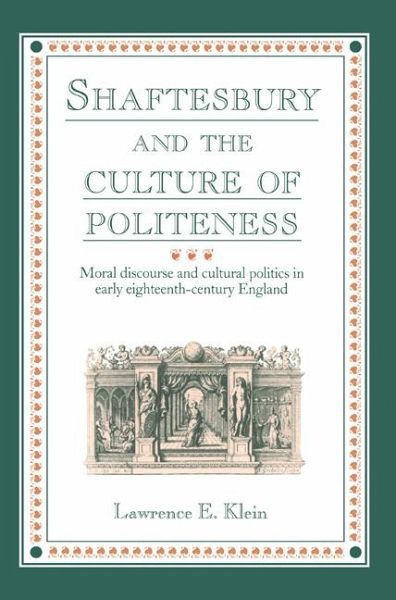
Shaftesbury and the Culture of Politeness
Moral Discourse and Cultural Politics in Early Eighteenth-Century England

PAYBACK Punkte
21 °P sammeln!
A study of the social and political thought of the third Earl of Shaftesbury, a pivotal figure in eighteenth-century thought and culture.The third Earl of Shaftesbury was a pivotal figure in eighteenth-century thought and culture. Professor Klein's study is the first to examine the extensive Shaftesbury manuscripts and offer an interpretation of his diverse writings as an attempt to comprehend contemporary society and politics and, in particular, to offer a legitimation for the new Whig political order established after 1688. As the focus of Shaftesbury's thinking was the idea of politeness, t...
A study of the social and political thought of the third Earl of Shaftesbury, a pivotal figure in eighteenth-century thought and culture.
The third Earl of Shaftesbury was a pivotal figure in eighteenth-century thought and culture. Professor Klein's study is the first to examine the extensive Shaftesbury manuscripts and offer an interpretation of his diverse writings as an attempt to comprehend contemporary society and politics and, in particular, to offer a legitimation for the new Whig political order established after 1688. As the focus of Shaftesbury's thinking was the idea of politeness, this study involves the first serious examination of the importance of the idea of politeness in the eighteenth century for thinking about society and culture and organising cultural practices. Through politeness, Shaftesbury conceptualised a new kind of public and critical culture for Britain and Europe, and greatly influenced the philosophical and cultural models associated with the European Enlightenment.
Table of content:
Introduction; Part I. Polite Philosophy: 1. The amalgamation of philosophy and breeding; 2. Lord Ashley's Inquiry: The philosophy of sociability and its context; 3. The notebooks: the problem of the self; 4. The notebooks; philosophy in the inner life; 5. Philosophy in society; 6. Philosophical writing; Part II. Polite Whiggism: 7. From politics to cultural politics; 8. The critique of the Church; 9. The critique of the Court; 10. The culture of liberty.
The third Earl of Shaftesbury was a pivotal figure in eighteenth-century thought and culture. Professor Klein's study is the first to examine the extensive Shaftesbury manuscripts and offer an interpretation of his diverse writings as an attempt to comprehend contemporary society and politics and, in particular, to offer a legitimation for the new Whig political order established after 1688. As the focus of Shaftesbury's thinking was the idea of politeness, this study involves the first serious examination of the importance of the idea of politeness in the eighteenth century for thinking about society and culture and organising cultural practices. Through politeness, Shaftesbury conceptualised a new kind of public and critical culture for Britain and Europe, and greatly influenced the philosophical and cultural models associated with the European Enlightenment.
Table of content:
Introduction; Part I. Polite Philosophy: 1. The amalgamation of philosophy and breeding; 2. Lord Ashley's Inquiry: The philosophy of sociability and its context; 3. The notebooks: the problem of the self; 4. The notebooks; philosophy in the inner life; 5. Philosophy in society; 6. Philosophical writing; Part II. Polite Whiggism: 7. From politics to cultural politics; 8. The critique of the Church; 9. The critique of the Court; 10. The culture of liberty.




